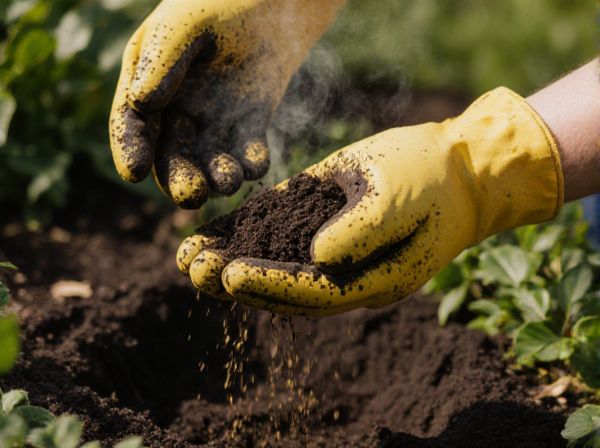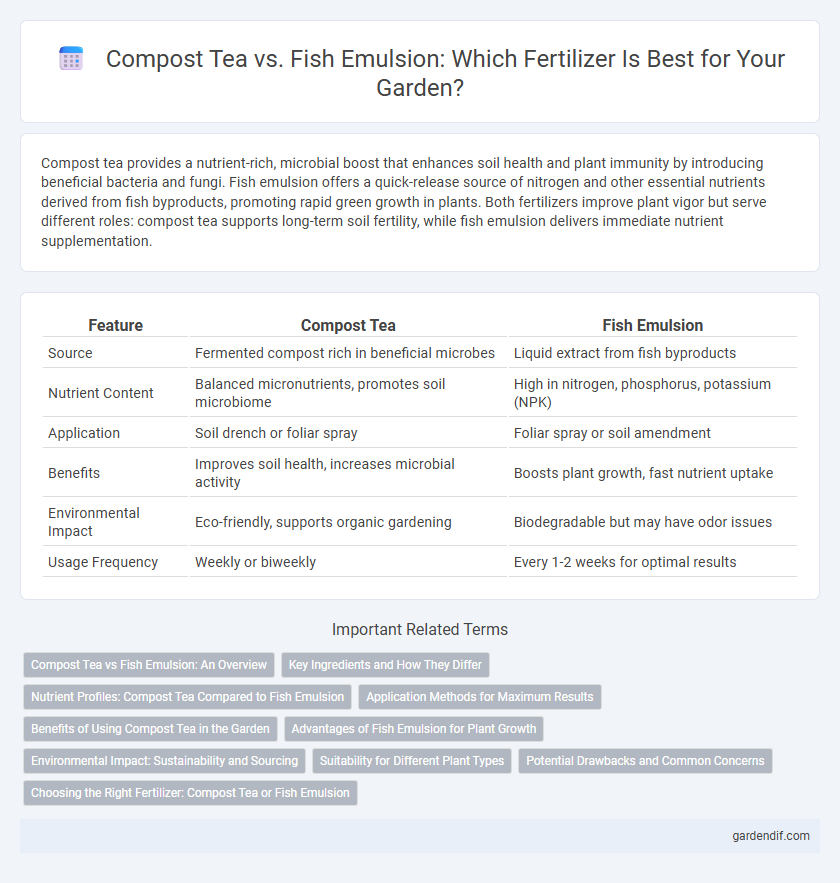
Compost tea vs Fish emulsion Illustration
Compost tea provides a nutrient-rich, microbial boost that enhances soil health and plant immunity by introducing beneficial bacteria and fungi. Fish emulsion offers a quick-release source of nitrogen and other essential nutrients derived from fish byproducts, promoting rapid green growth in plants. Both fertilizers improve plant vigor but serve different roles: compost tea supports long-term soil fertility, while fish emulsion delivers immediate nutrient supplementation.
Table of Comparison
| Feature | Compost Tea | Fish Emulsion |
|---|---|---|
| Source | Fermented compost rich in beneficial microbes | Liquid extract from fish byproducts |
| Nutrient Content | Balanced micronutrients, promotes soil microbiome | High in nitrogen, phosphorus, potassium (NPK) |
| Application | Soil drench or foliar spray | Foliar spray or soil amendment |
| Benefits | Improves soil health, increases microbial activity | Boosts plant growth, fast nutrient uptake |
| Environmental Impact | Eco-friendly, supports organic gardening | Biodegradable but may have odor issues |
| Usage Frequency | Weekly or biweekly | Every 1-2 weeks for optimal results |
Compost Tea vs Fish Emulsion: An Overview
Compost tea and fish emulsion are both organic fertilizers that enhance soil fertility and plant health through different mechanisms. Compost tea, a liquid extract brewed from compost, delivers beneficial microorganisms and nutrients to improve soil microbiology and nutrient availability, while fish emulsion, made from processed fish byproducts, provides a quick-release source of nitrogen, phosphorus, and trace minerals essential for rapid plant growth. Choosing between compost tea and fish emulsion depends on the desired nutrient release rate and the specific soil and crop requirements.
Key Ingredients and How They Differ
Compost tea is a liquid fertilizer brewed from aerated water, compost, and microbial-rich organic matter, providing beneficial bacteria and fungi that enhance soil health. Fish emulsion, derived from processed fish waste, contains high levels of nitrogen, phosphorus, and trace minerals, offering a direct nutrient boost for plant growth. The key difference lies in compost tea's emphasis on microbial life for soil improvement versus fish emulsion's concentrated nutrient delivery for rapid fertilization.
Nutrient Profiles: Compost Tea Compared to Fish Emulsion
Compost tea offers a balanced nutrient profile rich in beneficial microorganisms, organic matter, and micronutrients that enhance soil health and plant growth. Fish emulsion provides a high concentration of nitrogen and trace minerals, promoting rapid vegetative growth but with less microbial diversity than compost tea. The choice between compost tea and fish emulsion depends on the specific nutrient needs and soil microbial enhancement goals of the crop.
Application Methods for Maximum Results
Compost tea is applied as a foliar spray or soil drench, delivering beneficial microbes directly to plant leaves and root zones, enhancing nutrient uptake and disease resistance. Fish emulsion is typically diluted and used as a soil drench or foliar spray, providing a rich source of nitrogen and trace minerals that promote vigorous plant growth. Optimal application timing and concentration vary for each, but both require consistent use to maximize nutrient availability and plant health.
Benefits of Using Compost Tea in the Garden
Compost tea enhances soil microbial activity by introducing beneficial bacteria and fungi that improve nutrient availability and plant health. It promotes stronger root development and increases disease resistance, leading to more vigorous plant growth without the risk of chemical buildup. This organic liquid fertilizer also supports sustainable gardening practices by recycling organic waste into a nutrient-rich solution.
Advantages of Fish Emulsion for Plant Growth
Fish emulsion offers a rich source of essential nutrients like nitrogen, phosphorus, and potassium, promoting robust plant growth and improved root development. Its naturally occurring amino acids and trace minerals enhance nutrient uptake and stimulate microbial activity in the soil, leading to healthier plants. Unlike compost tea, fish emulsion is fast-acting and easily absorbed, making it ideal for quick nutrient boosts during critical growth stages.
Environmental Impact: Sustainability and Sourcing
Compost tea offers a sustainable fertilizer option by recycling organic waste and enhancing soil microbiome without introducing synthetic chemicals. Fish emulsion relies on fish byproducts, raising concerns about overfishing and marine ecosystem disruption despite being biodegradable. Choosing compost tea reduces environmental strain through renewable sourcing, while fish emulsion's impact depends heavily on fishing practices and supply chain transparency.
Suitability for Different Plant Types
Compost tea is highly suitable for a wide variety of plants, including vegetables, flowers, and herbs, due to its rich diversity of beneficial microbes and balanced nutrients that promote healthy soil ecosystems. Fish emulsion is ideal for fast-growing, leafy plants such as lettuce, spinach, and corn, providing a quick boost of nitrogen that supports lush foliage development. Both fertilizers offer targeted nutrient profiles, with compost tea enhancing soil biology and fish emulsion delivering rapid nutrient availability, making each effective for specific plant needs.
Potential Drawbacks and Common Concerns
Compost tea may harbor harmful pathogens if not brewed correctly, leading to potential plant diseases and the risk of spreading contaminants. Fish emulsion often has a strong odor that can be unpleasant and attract pests, and excessive use can cause nitrogen burn or nutrient imbalances in plants. Both fertilizers require careful application rates and quality control to avoid negative impacts on plant health and the surrounding environment.
Choosing the Right Fertilizer: Compost Tea or Fish Emulsion
Compost tea offers a rich blend of beneficial microbes that enhance soil biology and nutrient uptake, making it ideal for improving soil health and plant resilience. Fish emulsion provides a fast-acting, nitrogen-rich liquid fertilizer that supports vigorous leaf growth and is especially effective for leafy vegetables and heavy feeders. Selecting the right fertilizer depends on your crop's nutrient needs and whether you prioritize long-term soil enrichment or immediate nutrient supply.
Compost tea vs Fish emulsion Infographic

 gardendif.com
gardendif.com